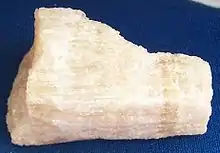gypsum
English

Gypsum
Alternative forms
- gypse (obsolete)
Etymology
From Latin gypsum, from Ancient Greek γύψος (gúpsos). Doublet of gesso.
Pronunciation
- (UK, General American) IPA(key): /ˈd͡ʒɪp.səm/
Audio (Southern England) (file)
Noun
gypsum (countable and uncountable, plural gypsums or gypsa)
- A mineral consisting of hydrated calcium sulphate. When calcinated, it forms plaster of Paris.
- 1980, Robert M. Jones, editor, Walls and Ceilings, Time-Life Books, →ISBN, page 7:
- Besides being abundant, gypsum is easily refined into a powder for plaster or formed into sheets of wallboard.
-
Synonyms
Hypernyms
Coordinate terms
Derived terms
Related terms
Translations
mineral
|
Further reading
- David Barthelmy (1997–2023), “Gypsum”, in Webmineral Mineralogy Database.
- “gypsum”, in Mindat.org, Hudson Institute of Mineralogy, 2000–2023.
 gypsum on Wikipedia.Wikipedia
gypsum on Wikipedia.Wikipedia
Latin
Etymology
Borrowed from Ancient Greek γύψος (gúpsos).
Pronunciation
- (Classical) IPA(key): /ˈɡyp.sum/, [ˈɡʏps̠ʊ̃ˑ]
- (Ecclesiastical) IPA(key): /ˈd͡ʒip.sum/, [ˈd͡ʒipsum]
Declension
Second-declension noun (neuter).
| Case | Singular | Plural |
|---|---|---|
| Nominative | gypsum | gypsa |
| Genitive | gypsī | gypsōrum |
| Dative | gypsō | gypsīs |
| Accusative | gypsum | gypsa |
| Ablative | gypsō | gypsīs |
| Vocative | gypsum | gypsa |
Descendants
- Asturian: yelsu, xiz
- Catalan: guix
- → Dutch: gips
- → English: gypsum
- → French: gypse
- Friulian: ges
- Galician: xeso, xiz
- → German: Gips, Gyps
- Italian: gesso
- → English: gesso
- → Norwegian: gips
- → Polish: gips
- Portuguese: giz, gesso, → gipso
- Romanian: ghips
- → Russian: гипс (gips)
- → Kazakh: гипс (gips)
- Serbo-Croatian:
- Sicilian: jissu
- Spanish: gis, yeso
- Venetian: xeso, ges
References
- “gypsum”, in Charlton T. Lewis and Charles Short (1879) A Latin Dictionary, Oxford: Clarendon Press
- “gypsum”, in Charlton T. Lewis (1891) An Elementary Latin Dictionary, New York: Harper & Brothers
- gypsum in Gaffiot, Félix (1934) Dictionnaire illustré latin-français, Hachette
- “gypsum”, in The Perseus Project (1999) Perseus Encyclopedia
This article is issued from Wiktionary. The text is licensed under Creative Commons - Attribution - Sharealike. Additional terms may apply for the media files.